Sermon preached by Joel Mann in Plymouth on December 22, 1820.

A DISCOURSE
DELIVERED IN BRISTOL, DECEMBER 22, 1820
ON THE
ANNIVERSARY OF THE LANDING OF OUR
ANCESTORS
AT PLYMOUTH
BY JOEL MANN
COLLEAGUE PASTOR OF The Catholic Congregational Church
WARREN
Printed By S. Randall
1821
No apology need be offered for this discourse. The event which occasioned it must ever be held in grateful remembrance by all the real friends of religious liberty.
Should any consider this as an attack upon any denomination of Christians among us, they will do injustice to the motives and feelings of the author. This discourse has no reference to any sect in this country besides our own.
We consider that it is exceedingly important to cultivate the exercise of Christian charity. But, is it quite charitable to refuse us the privilege of speaking in support of the principles which we do most sincerely and conscientiously believe to accord with the gospel; and which our fathers have transmitted to us at the expense of everything dear to them in life? Be it known to all men, that, so long as we stand on the soil of New-England—the land which embosoms the ashes of our holy fathers, it is our absolute incontrovertible, right to maintain those principles. There is no set of men on earth that has any right to interfere or object to our doing it whenever we please.
Most cordially would we embrace in Christian fellowship all who love the Lord Jesus Christ in sincerity; and rejoice in all the prosperity of Zion.
In regard to the style of this discourse, the author has nothing to say, except it was a hurried production of two or three days labour in the midst of other duties and cares.
DISCOURSE
Psalm 44; 1, 2. We have heard with our ears, O God, our fathers have told us, what work thou didst in their days in times of old. How thou didst drive out the heathen with thy hand, and plantedest them; how thou didst afflict the people, and cast them out.
I Kings 8: 57, 58. The Lord our God be with us, as he was with our fathers: let him not leave us, nor forsake us; that he may incline our hearts unto him, to walk in all his ways, and to keep his commandments, and his statutes, and his judgments, which he commanded his fathers.
This day completes the second century since our pious forefathers landed in this western world, and began a settlement at the town of Plymouth. This was an event of great importance to the cause of religion, and the civil rights of man. It was an event which calls on us for gratitude to that gracious being who was their guide and Protector. It was an event which commenced a new era in the annals of history; an era presenting new and interesting features in civil & religious polity; an era, which witnessed a reformation in the Church of Christ, and a return to its primitive form—its apostolick simplicity. It was an event which laid the foundation for our religious liberty. The kind Shepherd of Israel brought out our fathers from oppressions more intolerable than those of Egypt; and planted them hers, that they might enjoy that purity of worship which was instituted by Christ and his apostles.
My design in the following remarks is to give a simple statement of facts, showing the causes why the first settlers of New-England left their native country, and came to this part of the world. And also to take a view of their first establishment in what was then a lonely wilderness. What may be stated on this very interesting subject, I have drawn from the authentick histories of that age.
Let me premise particularly, that nothing, which will be presented in this discourse, is intended to bring any reproach on any denomination of Christians among us. Indeed, all the difficulties, to which we may allude, were difficulties in the Church of England; and all her persecutions were persecutions of their own members. The non-conformists were her own ministers, and her own members.
1. The Cause of the removal of our fathers to this section of the world was, unwillingness on their part to confirm to all the rites, and ceremonies, and principles of the Church of England; and an unyielding persecution on the part of the dignitaries of that church for this non-conformity. It would be recollected that there had been but recently a reformation from popery. A very powerful opposition had existed throughout England against the absurdities, and abuses of the Roman Catholic Church. This we shall presently shew by a recurrence of the facts.
The non-conformists, or puritans wished to have the reformation complete, by reducing the forms of worship and the government of the church to its simple simplicity. They wished to have it as it was organized by its Divine Founder. Or, if there must be established forms, that they should not be repugnant to the principles of the gospel. All this appears reasonable; but reasonable as it was, the avowal of these sentiments exposed them to abuses and persecutions.
The non-conformists maintained also, that the offices of bishops and arch-bishop, deans and arch-deans, &c. were contrary to the gospel,–were the inventions of the pride of man, and an infraction upon the rights of presbyters, who are the only order of ministers established by Christ and his apostles. They maintained, on scripture ground, that all regular ministers are of equal authority and have equal rights, and that Christ forbade any official supremacy. They maintained also, that every church is independent, and has a right to choose its own pastor, and manage its own concerns. These principles, we may easily conceive, exasperated the dignitaries of the church to the highest degree. The arch-bishops continually represented to their royal majesties, that these principles were not only subversive of the government of the church, but also of that of the nation. The effort of this was, that the authority of the crown was vigorously employed to exterminate the principles of the puritans. For more than sixty years before our fathers came hither, the throne was continually sending forth orders, edicts, , and proclamations against them. Through several successive reigns including that of Elizabeth, the puritans had no rest or safety.
These things will be seen in a true light by quoting their own words relative to the facts. A petition was presented by bishop Sandys, praying—“that private baptism and baptism by women may be taken out of the common prayer book. That the cross in baptism may be disallowed as needless and superstitions. And that commissioners may be appointed to reform the ecclesiastical laws.”1 At the same time session of parliament another paper was presented signed by thirty three ministers, some of whom were deans, some arch-deans, and some proctors. They requested “that none may baptize but ministers; and that they may leave off the sign of the cross. That, at the ministration of the communion, the posture of kneeling may be left indifferent. That the use of copes and surplices may be taken away; so that all the ministers may use a grave, comely garment, as they commonly do in preaching; that ministers be not compelled to wear such gowns and caps, as the enemies of Christ’s gospel have chosen to be the special array of their priesthood;–that all the saints days, festivals, and holydays bearing the name of a creature, may be abrogated; and that the punishment of those who do not in all things conform, might be mitigated,” Many other petitions of similar import were presented at different times; but all were rejected and the petitioners either turned out of the ministry, or imprisoned, or banished, or put to death.
The famous martyr, Dr. Hooper, with several other of the most distinguished divines in the kingdom. viz. Rogers, Latimer, Coverdale, Taylor, Philpot, Bradford, &c. were cast into prison, because they questioned the propriety of wearing the white linen surplice, and the square cap, which the church had ordained to be worn. They objected to them because they were the habits of popish priests, and had been instruments of idolatry. All those holy men were afterward martyrs for their non-conformist principles.
The Book of Common Prayer gave authority in certain cases to women to baptize. The non-conformists objected to this as contrary to the word of God. They objected also to kneeling at the sacrament. Their own words on this point are these;–kneeling as the sacrament arose from the notion of transubstantiation of the elements, and is still used by the papists in the worship of their breaden God:–Who admit they should be guilty of idolatry in kneeling before the elements, if they did not believe them to be the real body and blood of Christ. This ceremony was not introduced into the church until antichrist had arisen to his full height; and there is no action in the whole service that looks so much like idolatry as this.”2 “It is mere invention of man not taught by Christ or his apostles. Besides the gesture of kneeling is contrary to the very nature of the Lord’s Supper which is ordained to be a banquet and sign of that sweet familiarity that is between him and the faithful. In what nations is it thought decent to kneel at banquets? &c.3 Christ and his apostles sat at a table.” The non-conformist wished, therefore, that this practice might be discontinued, because it had been an act of idolatry, and because it was not appropriate, nor agreeable to the example of Christ.
They maintained also, that no human authority had a right to impose ceremonies upon the church, which are not required by the gospel; that every church is entitled to the privilege of choosing its own pastor; and that every pastor ought to preach, and not merely read the established service. But in all things they were strenuously and cruelly opposed.
The non-conformist objected to the ring in marriage, and to this expression in the marriage service:–“With this ring, I thee wed, with my body I thee worship, and with all my worldly goods I thee endow, in the name of the Father and the Son, and the Holy Ghost.” This idolatrous phrase they could not conscientiously use. The Rev. Robert Johnson, parson of St. Clements, was apprehended and tried on the charge of having omitted the ring in marriage, & that he had baptized without making the cross! For these offences, and for omitting the above words in marriage in one particular instance, he was shut up in close prison till he died in great poverty and want.4
Many were arrested and brought before the ecclesiastical commission to answer the various charges exhibited against them, and to this question,–“whether the common prayer-book is every part of it grounded on scripture?” For not answering satisfactorily, the Rev. Messrs. Wyburn, Johnson, Brown, Field, Wilcox, Sparrow, and King, were deprived of their ministerial office, and the four last were committed to Newgate prison!
We have already said that the non-conformists or puritans objected to the numerous dignitaries of the Church. The Rev. Mr. Clarke, an officer in the University said in a sermon preached at St. Mary’s that “there ought to be an equality among the ministers of the church,” and that “the hierarchal orders of arch-bishops, patriarchs, and metropolitans, &c. were all introduced into the church by Satan.” For this he was summoned before the vice-chancellor, and expelled from the University. In a petition to parliament in 1586, the puritans say,–“It pierces our hearts with grief to hear the cries of the people for the word of God. The bishops preach not at all or but very seldom. They are encumbered with civilian affairs, not only in their own ecclesiastical commission; all which is contrary to Christ, who says;–my kingdom is not of this world.”5 We can only say here, that every word they uttered against the various dignities of the church, as being contrary to the institution of Christ, brought upon these pious, conscientious men more and more abuse and persecution.
In the year 1572 an act was passed requiring of all ministers of every grade to subscribe to the established articles of faith, the common prayer book, and all the forms therein prescribed. That year an hundred clergymen were deprived of their offices and their livings, and turned away from their people for refusing to subscribe to conformity.6
Previous to this, “the ministers of London were called before the convention, and required on pain of deprivation, to promise and subscribe conformity to the established costume of priests, and to the rites of the common prayer, the 39 articles, and the queen’s injunctions.” Many of these ministers refused compliance and were suspended and deprived of their office:–themselves and their families were reduced to extreme poverty. Rev. Mr. Sampson, dean of Christ Church, and Rev. Mr. Humphries, President of Magdalene College, two of the most eminent divines in the kingdom were imprisoned! The next year, the clergy of London were called up again and required to an absolute conformity; and 37 of them for non-conformity were at once deprived of their ministry, and many reduced to beggary, although the arch-bishop acknowledged they were some of the best preachers in the nation! Very many churches were shut up, and the people deprived of all publick means of salvation!
A little after this, the chief remaining ministers of London, with about one hundred others shared the same fate.
In 1573, the queen published another proclamation, that “all non-conformists should be severely punished.” In the single diocese of Norwich three hundred ministers were suspended at one visitation.7 Some of the most noted were committed to Newgate for refusing to declare, that “the common prayer-book is every part of it grounded on scripture.”
About this time the Baptists appeared:–27 of them were apprehended at a publick meeting; –nine of them banished, and two burnt.
In a few years the persecution made a great scarcity of preachers throughout the kingdom. “In the populous town of Northampton there was not one left.” Some were deprived of their office and forbidden to preach;–some banished, some were imprisoned, and some put to death. The sufferings they endured for conscience’s sake may be faintly perceived by adverting to some of the petitions they sent from their gloomy prisons. In one they say, “We have been condemned to a year’s imprisonment, which we have patiently suffered in the common goal of Newgate, besides four months of close imprisonment before our conviction, which we apprehend to be contrary to law; by these means our poor wives and children are utterly impoverished; our health is very much impaired by the unwholesome savor of the place, and the cold weather; and we are like to suffer still greater extremities. We therefore humbly beseech for the tender mercies of God, and in consideration of our poor wives and children, that we may be set free; or, if that cannot be obtained, that we may be confined in a more wholesome prison.”
Petitions were sent from all quarters by the imprisoned ministers, drawn up in the most effective language, and depicting the most pitiful sufferings. One from the clergy of London, Ely, and Cambridge, says, “We commend to your honors’ compassion, our poor families, together with the cries of our poor people, who are hungering after the word, and are now as sheep having no shepherd. We have applied to the arch-bishops but can get no relief; we therefore humbly beg it at your honors’ hands.”8 But all these moving petitions from ministers and people were all of no avail, so long as those who made them refused absolute conformity to all the forms and dogmas of the church. “What could wise and good men do more in a peaceable way for the liberty of their consciences? They petitioned the queen, applied repeatedly to both houses of parliament, and addressed the convocation and bishops; they moved no riots nor seditions, but fasted and prayed for the queen and the church, as long as they were allowed; and when they could serve them no longer, they patiently submitted to suspensions and deprivations, fines, and imprisonments, til it should please God, of his infinite mercy to open a door for their further usefulness.”
by a supplication from the county of Cornwall it appeared that there were above 90,000 souls, that for want of the word of God were in extreme misery and ready to perish. And they had one hundred and sixty churches either destitute of preachers, or supplied by men guilty of the grossest vices. And this too, when their pious learned ministers were deposed or imprisoned for not being willing to subscribe to forms and principles not warranted by the word of God. Frequently were they imprisoned by the prelates of four or five years without trial, without bail, and without cause. Mr. Barrow and Mr. Greenwood were both executed at Tyburn.
To prevent the puritans from defending their cause, the arch-bishop obtained an order from the queen suppressing the freedom of the press; and establishing a heavy penalty on anyone who should publish any book before it had been submitted for his examination.
All that we have now stated is but just entering a very little into the history of the times which preceded the coming of our pious forefathers. These are but a few facts; and dreadful as they were, they were almost nothing when compared with the shocking barbarities practiced upon the Presbyterians of Scotland under the reign of Charles 2nd. I must refer you to Bishop Burnet’s history for an account of those tragical scenes. I will only observe, that at the beginning of that reign, 2000 ministers were turned out of their livings in one day. And these were the most learned and fearful in the nation!9 The meetings of the Presbyterians were hunted and fired upon by armed forces, “and their blood often mingled with their sacrifices.” All kinds of torture were inflicted upon their bodies;– multitudes were put to death in different ways; and 18000, says Wodrow in his history, suffered in the cruelties of that period.
It should be recollected here that the churches in Scotland were all Presbyterian without a single exception; and had been so for many years, peaceably enjoying their own privileges. But, because, they would not submit, when called upon, to have bishops and arch-bishops set over them by the church of England; and because they would not receive the prayer-book and observe its forms , the most horrible barbarities were inflicted upon them.
But to go any further into particulars here would be increasing the painful sensations of your hearts. We refer you to Neal’s history of the Puritans, together with Bishop Burnet’s history for a particular statement of all the oppressions and sufferings they endured.
I will only observe, that among the non-conformist ministers there were arch-bishops, deans and arch-deans, and some of al grades in the Church of England. It must be remembered that they belonged to that church through all these oppressions, and did not separate from it. They did not wish for divisions. They wished only to see their religion divested of the absurdities & mummery of Roman Catholickism; and brought to that simplicity and purity in which it was instituted by Christ and his apostles. They were men the most eminent for their learning and piety, and willing to suffer anything to for the cause of the Redeemer. No charges were ever substantiated against them, only that they were unwilling to submit to things repugnant to their consciences. For non-conformity to such things, the dignitaries of the church, supported by the crown, deprived the greater portion of the congregations of their faithful beloved ministers; and either shut up the places of worship or put into them a set of men wholly unfit for the sacred office. Very many of them could not preach, and did nothing but read the established service. Many were so ignorant that they could not read it intelligibly, and many were infamous for their vices. “If the people would hear sermons they must go many miles, and at the same time be fined every Sabbath for being absent from their own parish church.”
These, my hearers, were some of the reasons why our forefathers left their native land came to this western world. These were some of their afflictions and persecutions.
2. Let us now consider some of their planting themselves in this country.
Finding that all endeavours for a reform in England were hopeless, and that they were never to be allowed liberty of conscience, the non-conformists came to the conclusion that a separation was necessary. Consequently ‘a number of these devout Christians entered into a covenant, wherein expressing themselves desirous of not only of attending divine worship with a freedom of human inventions, but also of enjoying all the evangelical institutions of that worship; and , like those Macedonians, whom Paul commended, they gave themselves first unto God, and then to one another.’ “they peaceably & willingly embraced a banishment into the Netherlands; where they settled at the city of Leyden”10 Here they remained seven or eight years under the pastoral care of Rev. John Robinson. The inconveniencies they experienced in this situation caused them to think of removing to this part of the world. Preparations were accordingly made. They sold their estates, and obtained two vessels for their transportation, one of which however failed them. A day of fasting and prayer was observed, and they prepared to embark. “Their excellent pastor, on his knees by the seaside, poured out their mutual petitions unto God; and having wept in each other’s arms as long as wind and tide would permit, they bade adieu.
After a tempestuous voyage, in which they suffered much, they arrived at the wilderness of New-England, and planted themselves at a place they called New Plymouth. Here they erected some cottages to protect them from the inclemencies of approaching winter. Numerous were their privations and afflictions. In a few months a mortal sickness swept off more than half their number. Worn down by disease and sorrow,–surrounded with gloomy forests filled with ferocious Indians, in want of food, and comfortable dwellings, they sighed away a tedious winter.
But they were not destitute of comforts. The religion of Jesus, for which they endured these sufferings, afforded their divine consolation. The God of Israel was their God, and therefore, “although cast down they were not forsaken.” The pain of being separated from their native country, and their beloved friends, and all the former endearments of life, was mitigated, in some degree, by the consideration that they were also separated from their enemies and persecutors. They were alone in a lonely world of forests; but God was with them here, and had peace of conscience and peace with one another.
Here we must drop the history of this pious company of pilgrims. The arm of God was their defence. His smiles were their richest blessings. Never did Israel, sojourning in the wilderness, present to the eye of Jehovah such an interesting and beloved spectacle as that little band of humble believers. In a few years a number of towns were settled, blessed with happy churches, walking in the faith and order of the gospel. In about 70 years after their arrival, there were in Massachusetts and Connecticut about 132 congregations and Presbyterian churches, blessed with pious and faithful ministers. Surely we may say as did the prophets; O God of hosts, thou hast brought a vine out of Egypt; thou hast cast out the heathen and planted it; thou preparedst room before it and did not cause it to take deep root and it filled the land; the hills were covered with the shadow of it, and the boughs thereof were like the goodly cedars.
Here permit me to observe, that all the Puritans were Calvinist in doctrine. Such were our learned and pious fathers. And the churches which were established here in the first century universally adopted the “Presbyterian Confession of Faith,” a part of which you have in the shorter catechism.
A few remarks will close this address.
We see how easily men may contend about religion in the violation of every principle of religion. The conduct of dignitaries of the English hierarchy indicated an entire want of that love and benevolence, without which the highest professions and warmest zeal may be nothing more than the mania of a party. They seemed to be governed by an exclusive regard for themselves. They knew, that if the non-conformists had succeeded in effecting a reformation in the church, their power and supremacy would have come to an end. They would have been put where ought to have been, on a level with other ministers of the gospel, There is reason to fear that it was an unhallowed pride, a haughtiness of soul, which caused them to oppose, in such a cruel, unchristian manner, the pious wishes of their brethren.
We may see also, that, when ministers and people from the instructions of the word of God, it is impossible to determine how far they may go in errors and absurdities. The Church of
England had exchanged the bible for the prayer book. The question with that body of men, was not, “’what saith the Lord?’ but, what saith the prayer book? The non-conformists only asked for the privileges of regulating their faith and their worship by the bible. Had this been granted them, they would have remained in peace. But the spiritual lord required absolute conformity to all the rites and ceremonies, and principles, which were or might be established by the combined influence of the civil and ecclesiastical authority. And is this the only true church of the blessed Redeemer? Are these the only true ministers of the meek and lowly Jesus?
In all the other countries of Europe, the reformed church were Presbyterian. They were such in Switzerland, in Genoa, in France, in Germany, in Holland, and in Scotland. And such they continue unto this day. In those nations, the churches which broke off from popery immediately returned to the original simplicity of Christianity. Their reformation was complete. They became Presbyterians or independents. But in England, the reformation was only partial. There, some of the absurdities of popery were renounced, and the rest of the system was retained. This was the cause of the difficultly with the non-conformists. They wished to have an entire reformation. But the prelates, seeing that this would destroy all their grandeur and power, were fixed in opposition.
From what has been said, we may learn to estimate our own invaluable privileges. How dearly have they been purchased! What an immensity of suffering, the fathers of New-England endures in laying the foundation of our religious freedom! While we venerate their characters, let us be thankful for their laborious exertions to establish a church on the pure and holy principles of the gospel, free from the inventions and oppressions of men.
The pleasure I feel on this interesting centurial anniversary is greatly heightened by the fact that I address a number of the immediate descendants of our pilgrim fathers. The names of Bradford and Howland, stand on the page of history among those who burst away from the shackles of ecclesiastical tyranny, and braved the dangers of the ocean and the wilderness for the enjoyment of religion in its apostolical simplicity.
John Bradford was burnt at the stake in Yorkshire. William Bradford was burnt at the stake in Yorkshire. William Bradford became pious when a very young man. Being reviled and persecuted for taking part with the non-conformists he said, “I am not only willing to part with everything that is dear to me in this world, for this cause, but I am also thankful that God has given me a heart so to do, and will accept me so to suffer for him.”11 Soon after he escaped into Holland with the persecuted people of God, and from thence came with our fathers to Plymouth. He was the first Governour of THE PLYMOUTH COLONY. Our late venerated and beloved Governour Bradford, who lived and died in this place, was one of his descendants.
Finally, my dear hears, shall we adhere to the privileges, which our ancestors, after so much suffering, have transmitted to us? Or shall we abandon them? Shall we maintain those scriptural doctrines which they maintained, and which gave them “strong consolation?” Or shall we reject them? Is it not in our hearts to say, we will support them? A cause so precious we will not abandon.
Let it be remembered, that New-England was the ground sought out by our fathers for the enjoyment of religion in its original simplicity and purity. This is the refuge, the asylum, the retreat of Presbyterians and independents; and here we claim a free exercise of our privileges.
May the Lord our God be with us, as he was with our fathers: Let him not leave us; that he may incline our hearts unto him, to walk in all his ways, and to keep his commandments and his statutes, and his judgments, which he commanded our fathers. Let us follow peace with all men, and holiness without which no man shall see the Lord. Grace be with all those who live our Lord Jesus Christ in sincerity.
“With shreds of papal vesture tied
to flaunting robes of princely pride.
In formal state, on sumptuous throne,
Daughter of her of Babylon,
Sat Bigotry. Her chilling breath
to fires of heavenly warmth was death;
Her iron scepter England swayed
Religion withering in its shade.
The shepherd might not kneel to call
on Him the common sire of all
Unless his lips with sharp constraint
Were tuned to accents cold and faint:
For man’s devices had o’erwrought
The volume by a Saviour brought,
And clogged devotion’s soaring wing
That up to heaven should instant spring,
With phrases set which bore no part
In the warm service of the heart.
Strong was the love to heaven which bare
From their dear homes and altars far,
The old, the young, the wise, the brave,
The rich, the noble, and the fair.
And led them o’er the mighty wave
Uncertain peril’s front to dare.
Strong was their love and strong the Power
Whose red right arm, in danger’s hour
Was bared on high their path to show,
Through changeful scenes of weal and wo.
Till in the wilderness arose
His church triumphant o’er her foes.”12
Endnotes
1 Neals History of the Puritans, 1:210.
2 Neal, 2:80.
3 Neal, 2:83.
4 Neal, 1:325.
5 Neal, 1:460.
6 Strype’s Annals, 187.
7 Eleuth, 8.
8 Neal, 1:403.
9 Eleuth, 21.
10 Mather’s Magnalia, 1:45.
11 Mather’s Magnalia, 1.
12 “Yamoyden” a very interesting poem by the Rev. J. W. Eastburn his Friend, recently published.
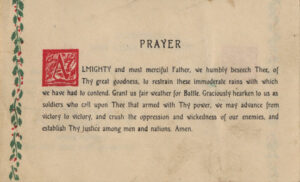 The forces of General George Patton were taking the brunt of the attack. On December 8th, Patton contacted his top chaplain, General James O’Neill, and asked for a prayer to change the weather.1
The forces of General George Patton were taking the brunt of the attack. On December 8th, Patton contacted his top chaplain, General James O’Neill, and asked for a prayer to change the weather.1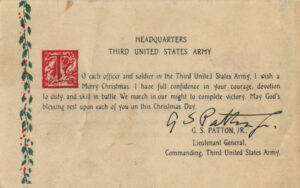 The reverse of the card carried a Christmas greeting from Patton:
The reverse of the card carried a Christmas greeting from Patton:
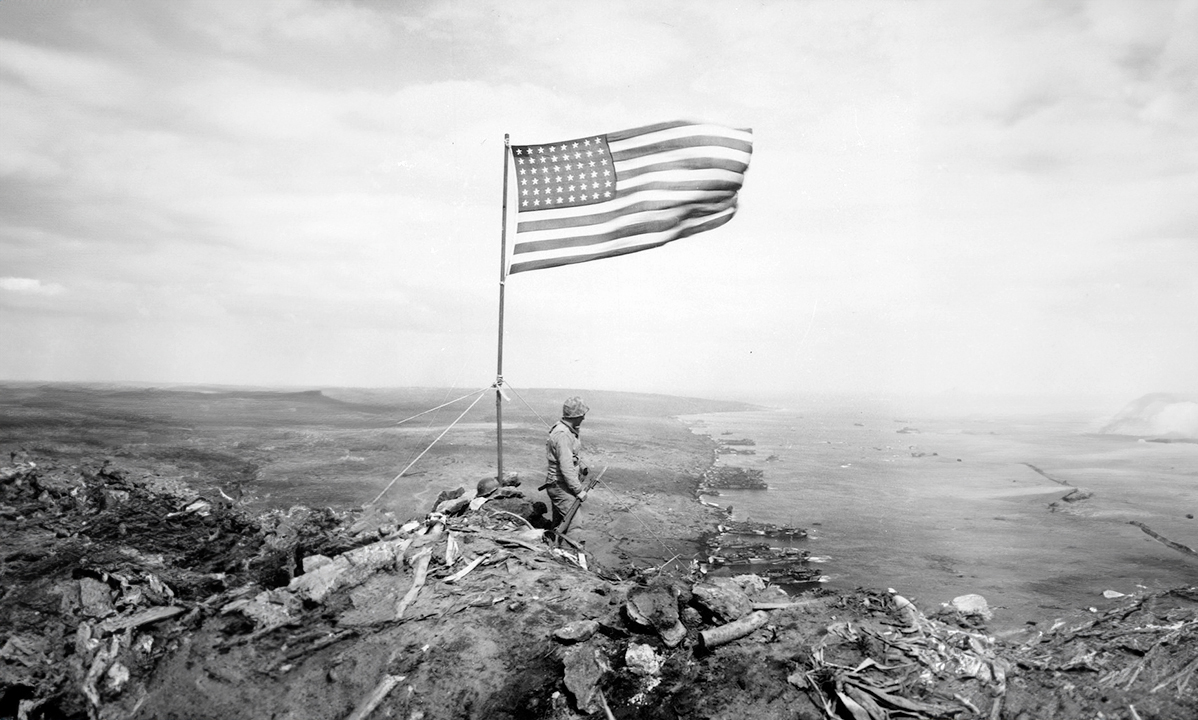
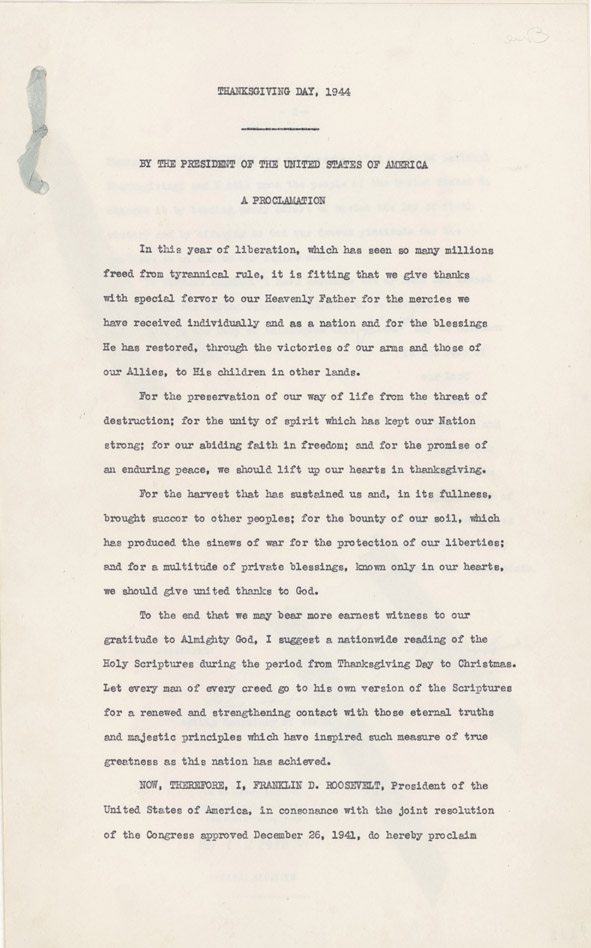
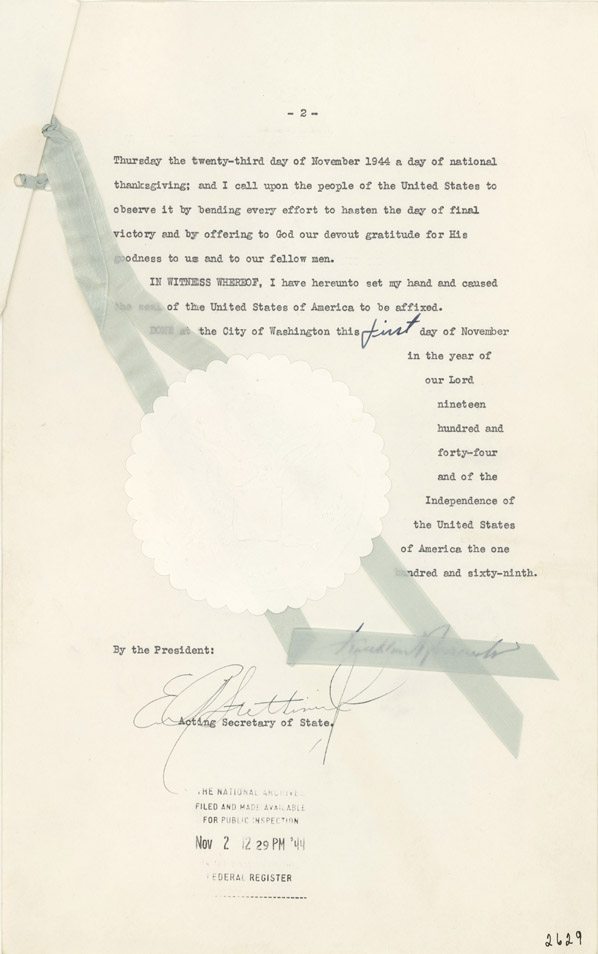
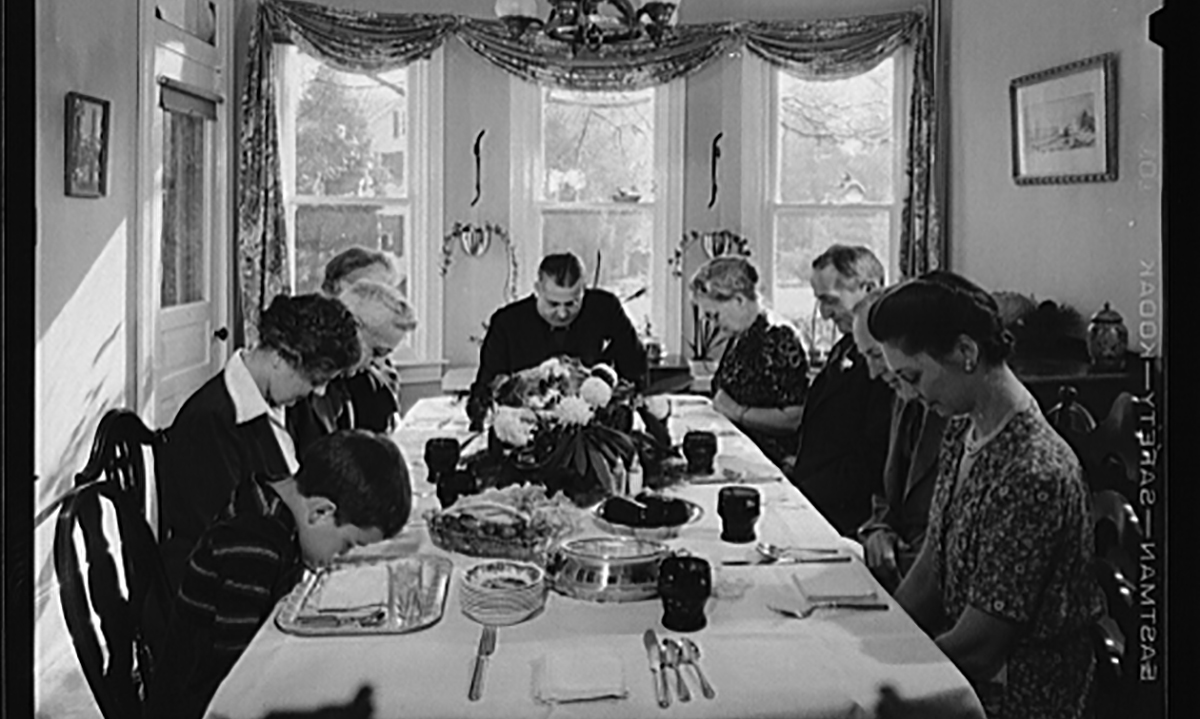
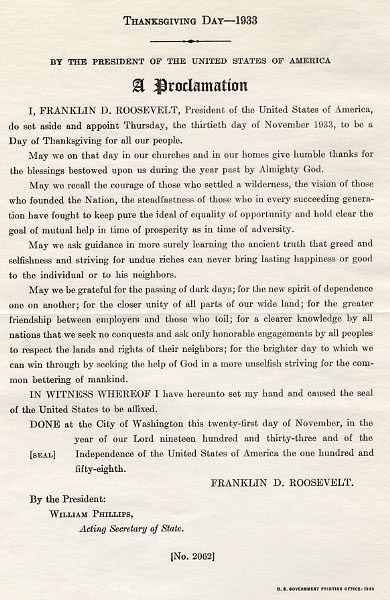
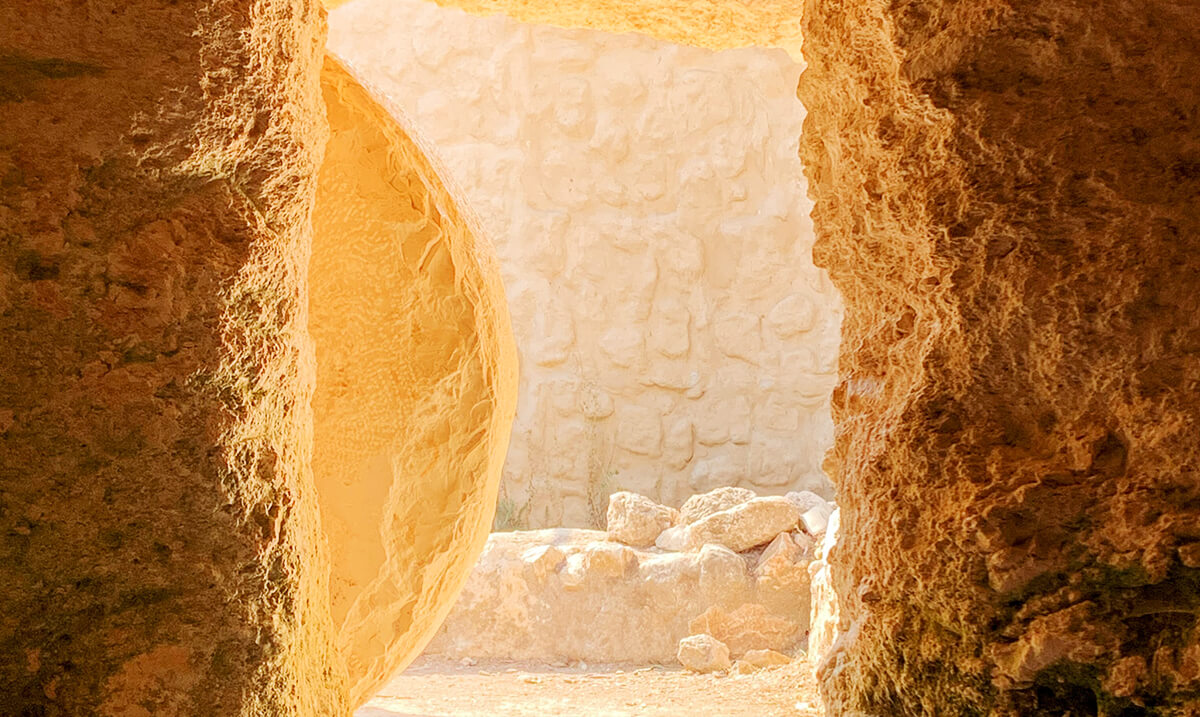
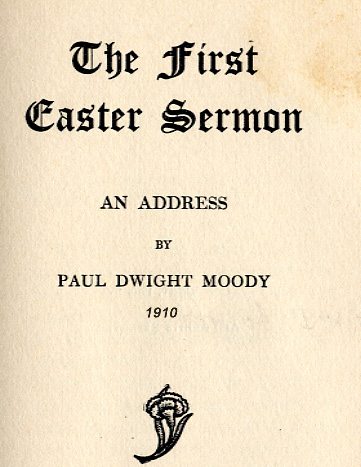

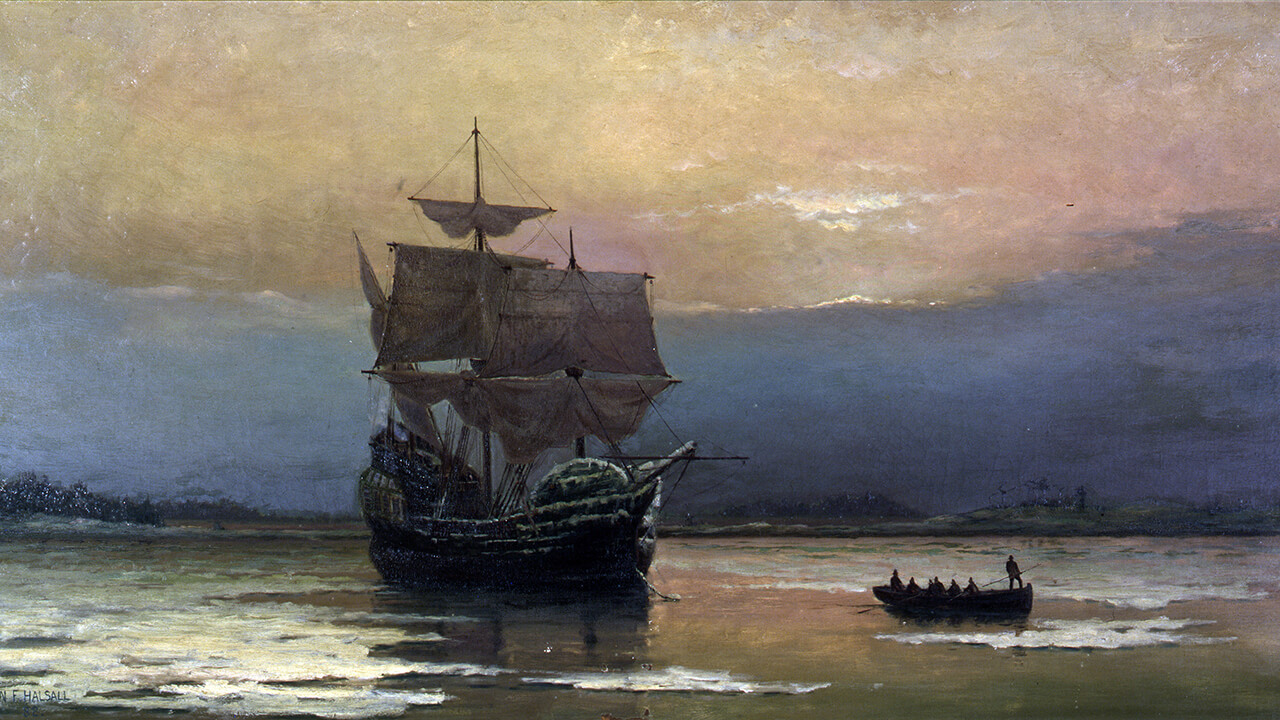
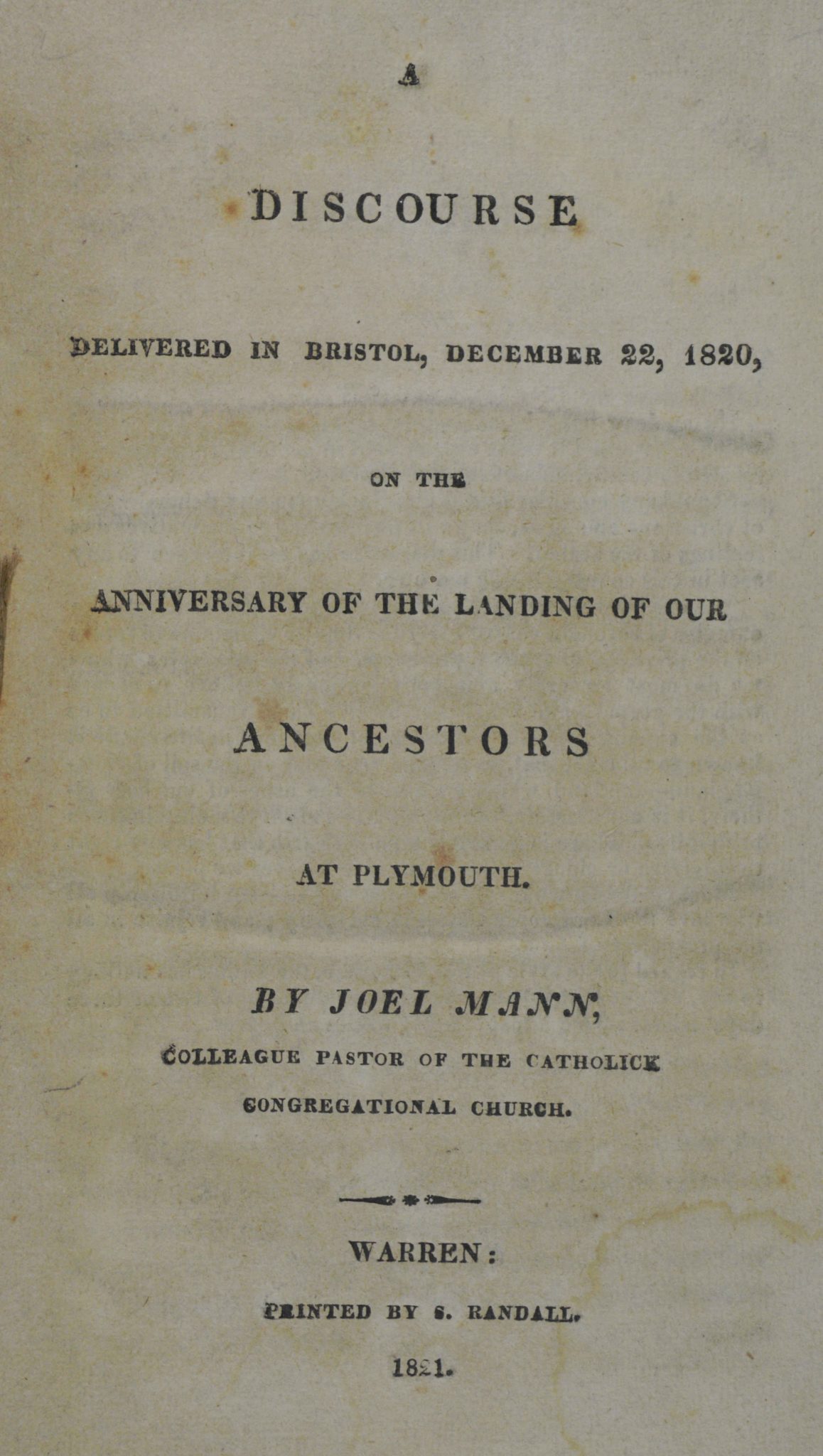
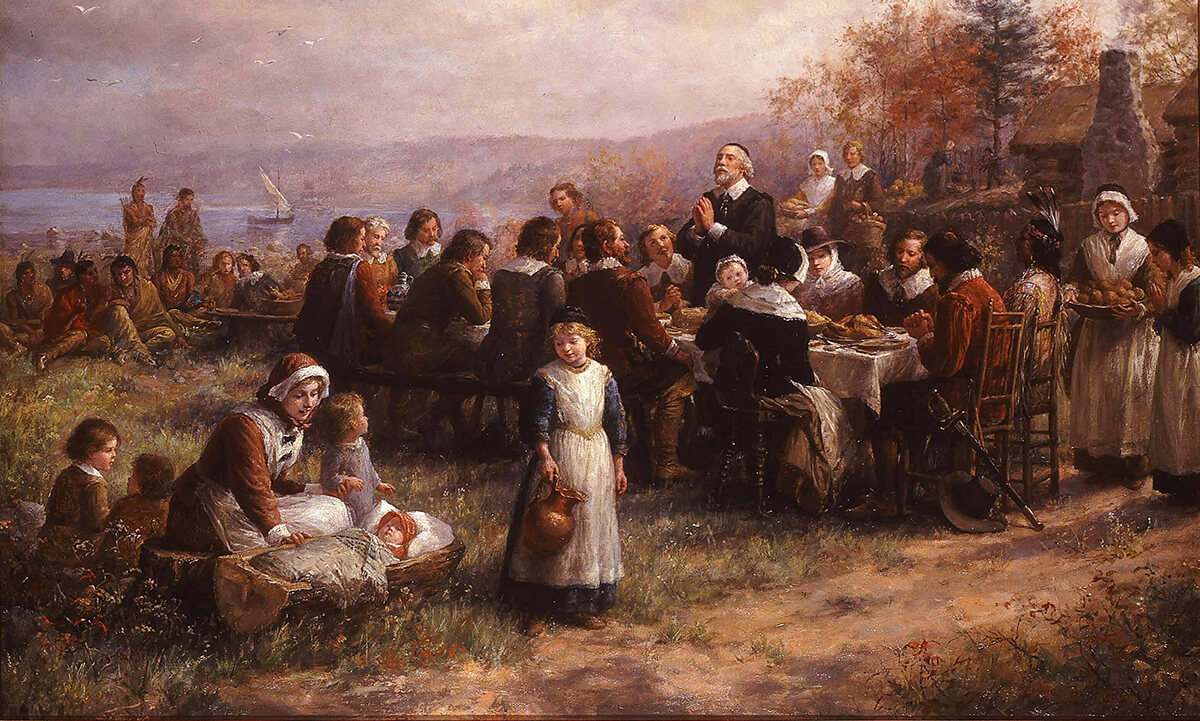
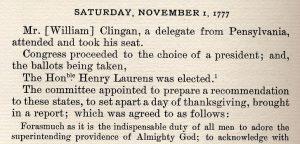
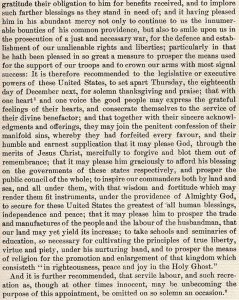 It is therefore recommended to the legislative or executive powers of these United States, to set apart Thursday, the 18th day of December next, for solemn thanksgiving and praise; that with one heart and one voice the good people may express the grateful feelings of their hearts, and consecrate themselves to the service of their divine benefactor; and that together with their sincere acknowledgments and offerings, they may join the penitent confession of their manifold sins, whereby they had forfeited every favor, and their humble and earnest supplication that it may please God, through the merits of Jesus Christ, mercifully to forgive and blot them out of remembrance; that it may please him graciously to afford his blessings on the governments of these states respectively, and prosper the public council of the whole; to inspire our commanders both by land and sea, and all under them, with that wisdom and fortitude which may render them fit instruments, under the providence of Almighty God, to secure for these United States the greatest of all blessings, independence and peace; that it may please him to prosper the trade and manufactures of the people and the labor of the husbandman, that our land may yield its increase; to take schools and seminaries of education, so necessary for cultivating the principles of true liberty, virtue and piety, under his nurturing hand, and to prosper the means of religion for the promotion and enlargement of that kingdom which consisteth in righteousness, peace and joy in the Holy Ghost.
It is therefore recommended to the legislative or executive powers of these United States, to set apart Thursday, the 18th day of December next, for solemn thanksgiving and praise; that with one heart and one voice the good people may express the grateful feelings of their hearts, and consecrate themselves to the service of their divine benefactor; and that together with their sincere acknowledgments and offerings, they may join the penitent confession of their manifold sins, whereby they had forfeited every favor, and their humble and earnest supplication that it may please God, through the merits of Jesus Christ, mercifully to forgive and blot them out of remembrance; that it may please him graciously to afford his blessings on the governments of these states respectively, and prosper the public council of the whole; to inspire our commanders both by land and sea, and all under them, with that wisdom and fortitude which may render them fit instruments, under the providence of Almighty God, to secure for these United States the greatest of all blessings, independence and peace; that it may please him to prosper the trade and manufactures of the people and the labor of the husbandman, that our land may yield its increase; to take schools and seminaries of education, so necessary for cultivating the principles of true liberty, virtue and piety, under his nurturing hand, and to prosper the means of religion for the promotion and enlargement of that kingdom which consisteth in righteousness, peace and joy in the Holy Ghost.